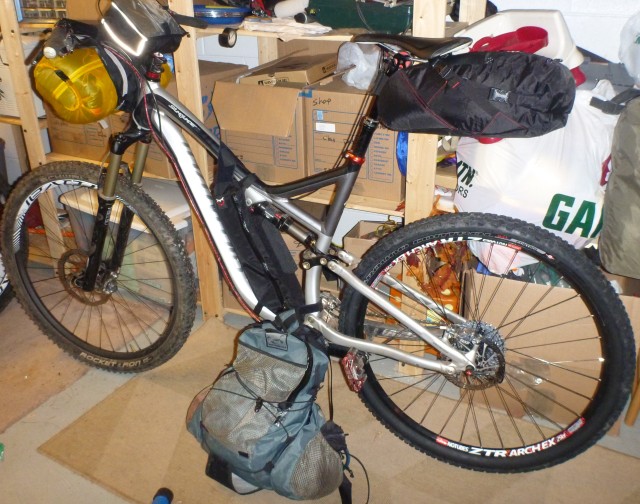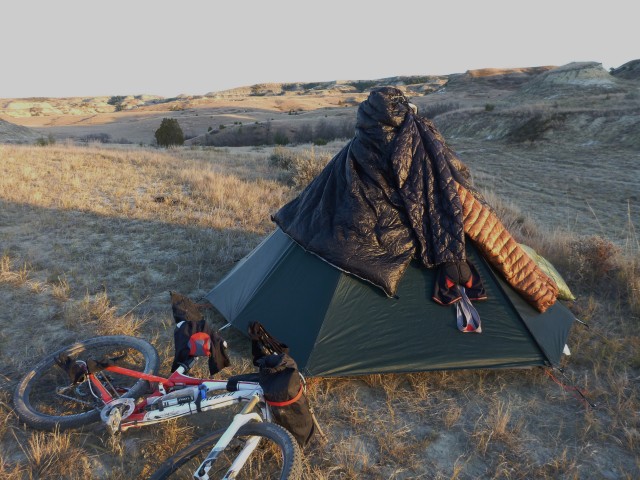Personal setups » Great plains in fall
Here is my set-up from a 4 day trip in western North Dakota in mid October.
Expected conditions:
High 55-80, record 90, low 35-50, record 25. Rain on 25% of the days.
Only 11 hrs of daylight.
High winds likely, very exposed. Dust storms possible.
Rain or snow possible, but not very common.
If it rains you can’t move on the trail, so you will either have to wait it out or bail on a gravel road.
Due to daylight and physical conditioning there would be a lot of time in camp.
Lot’s of thorns.
Bike:
2012 Specialized stumpjumper FSR 29, size XL.
Commandpost blacklite adjustable height seatpost
Carnegie high sweep bar
Rocket Ron 2.2 front tire, Fasttrack Control rear tire. Both tubeless.
Arch EX rear rim, Control trail carbon front rim.
Revelation 140 mm-110 mm travel adjust fork
22-33-bash crankset
11-36 rear cassette
Elixer 9 brakes, 160 mm rear rotor, 200 mm front.
Crankbrothers Mallet 3 pedals
This was a trip with my wife, so all group gear was shared, so the weight of the group gear is halved in the packing weight column.
Clothing worn most time:
I/O Merino Hoody XL baselayer shirt 228g/8oz
Specialized Adaptalite MTN glasses 32g/1.1oz
Specialized Ridge gloves 46g/1.6oz
Specialized Rime shoes 45 996g/35.1oz
Specialized Roubaix bibs L 218g/7.7oz
SWool Adrenaline socks 42g/1.5oz
Gira Xar helmet M 316g/11.1oz
Weight worn 1878g / 66oz
Wind shells for cool or windy weather:
MontBell Dynamo wind pants 82g/2.9oz
Stoic Wraith hooded wind jacket 72g/2.5oz
Dustmask 6g/0.2oz
Warm clothing, mostly for in camp/sleeping:
Powrstretch gloves 48g/1.7oz
MontBell UL down pants L 194g/6.8oz
Goosefeet down socks 63g/2.2oz
Stoic Hadron Down Hoody 242g/8.5oz
Sleep clothing/alternate socks:
S Wool boxer underpants (for sleeping) 90g/3.2oz
S Wool liner socks tall clothing socks 48g/1.7oz
Rain protection
Rainshield O2 rain jacket XL 178g/6.3oz
Rainshiled O2 rain pants XL 122g/4.3oz
bread bags (pr) clothing rain foot 16g/0.6oz
OR Versa shell gloves L 20g/0.7oz
Clothing carried 118g/41.7oz
Cooking:
plastic cup cook cup 30g/1.1oz
Jetboil 100g cartridge (cartridge only weight) 98g/3.5oz
Bic mini lighter 11g/ 0.4oz
Wetfire tinder 4g/0.1oz
Ti long spoon 16g/0.6oz
Jetboil SolTi stove set, no lid, 296g/10.4
10 micropur tablets 10g/0.4oz
AluminumWindscreen 20g/0.7oz
Per Person weight for cooking gear 253g/8.9oz
Miscellaneous:
Photo:
Lumix WP camera misc camera 200g/7.1oz
Health:
3 wet wipes, dried 14g/0.5oz
AMC 0.5 first aidkit (sil-nylon sack removed) 96g/3.4oz
Toiletp+gel in Aloksak 60g/2.1oz
toothbrush+Dr Bronn 48g/1.7oz
Sportslick antio microbial and anti chafing 40g/1.4oz
Chapstick 8g/0.3oz
Navigation:
PrincetonTec Eos headlamp 90g/3.2oz
Blackburn Flea tail light/tent light 18g/0.6oz
Apple I-phone 112g/4oz
Foretrex GPS 88g/3.1oz
map 45g/1.6oz
plate compass 28g/1.0oz
Repair:
UL tube 29″ (1 each) 182g/6.4oz
CrankB M13 minitool 170g/6.0oz
Lezyne M+gauge pump 114g/4oz
Patchkit 66g/2.3oz
Leathermn Squirt PS4 plier/scissr 56g/2.0oz
chain lube in microdropper 30g/1.1oz
Tenacious tape 22g/0.8oz
fiberfix spoke (1 each) 15g/0.5oz
neo air patch 15g/0.5oz
plastic tirelevers 14g/0.5oz
zipties set 6g/0.2oz
Packtowel 34g/1.2oz
wallet (aloksak few bills DL, CC) 30g/1.1oz
Per Person miscellaneous weight 1003g/35.4
Packing:
Wingnut backpack 642g/22.6oz
old REI barbag cockpit 154g/5.4oz
REvelate Tangle framebag 180g/6.3oz
Revelate Sling handlebar 98g/3.5oz
Pika seatbag seatbag 388g/13.7oz
S Airevac drybag 48g/1.7oz
clear packliner 38g/1.3oz
M Cuben Airevac 19g/0.7oz
small stuffsack 15g/0.5oz
Platypus Hoser 3l 106g/3.7oz
Packing gear weight 1679g/59oz
Shelter/Sleeping:
Bearpw Hex Inner tent 454g/16oz
RutaLocura carbon tent pole 150g/5.3oz
4 Carbon 9′ stakes 17g/0.6oz
7 Carbon 6″ Stakes 21g/0.7oz
Hex 3 s tent 772g/27.2oz
Neoair shortened 61″ sleep pad 332g/11.7oz
BPL? inflatable pillow 32g/1.1oz
EnLightened Equipment 40+ Wide Long quilt 574g/20.2oz
Per person shelter and sleeping weight 1664g/58.7oz
Total weight worn: 1878g / 66oz
Base pack weight: 5779g / 12.74lbs
Bike weight 13.85kg / 30.5 lbs
Notes:
Bags are heavy! I have as much weight in bags etc. as I do in sleeping and shelter combined, and that’s with using a 3 person double wall tent for 2!
I could go lighter by loosing the frame bag or the handlebar bag, but they help keep weight distributed low and provide a place for my map.
I did have slightly more carry capacity then needed.
The Revelate Pika rubbed on my tire when the seat was dropped all the way. I ended up just using the 1.5″ drop position.
We never had serious wind and no dust storms, but I think we would have been ok with the full fabric(non mesh) inner tent to keep the dust out..
If needed the Hex can stand up to tremendous wind. The Ruta locura pole worked very well.
I found I could wear my down socks inside my bikeshoes by taking out the insoles. this let me have warm feet and still walk around.
Highs were probably around mid 60’s and lows were probably around 25 F, 30 F, 55 F on the respective nights. There was some wind, but not strong, I’m guessing about 15 mph max.
I didn’t miss anything, we had all the gear/clothing we needed.
The only thing not used was the rain gear. But, given the chance of rain(it did rain briefly one night), and the low temps, I would not leave that behind. well, we aslo didn’t use the first aid kit, or most of the repair items.
I could also have left my windshirt behind, as I only used it on the bike very briefly, and then in camp. In camp I could have used my rainjacket instead. I am not sure though if I will leave it behind for a similar trip in future. If it had been slightly colder or windier, I would have worn it while active, and I do not like to wear my rain gear for that if it’s dry.
With our down gear over our base-layer shirts, and covered by windshells, we were comfortable on the coldest night and morning sitting in camp and we could adapt to different conditions while active as well.
We were comfortably warm wearing our down clothing inside our quilts on the coldest night (25F and damp), yet not overheating on the hot and dry last night. For me this is a big benefit of a quilt and of using high loft clothing as part of your sleep system.


Thanks for posting.
Q: Were you wearing down socks while riding or just when camped? I’m still trying to sort out my favorite sock for riding.
No not while riding! For one thing it was warm(see trip report), but also, you would never want to wear down socks while active. They slide around on themselves and once down gets wet, it doesn’t dry, so a bad combo with sweaty feet.
The down gear for top, legs and feet is simply for camp/sleep wear. Down is the the lightest most compact insulation available. On trips like these you are producing a lot of heat while biking during the warm time of day, then you sit still in the dark. The result is a huge difference in insulation needed on the bike vs off. So, that means you will be carrying your insulating clothing all day, and never wear it. That is why down is a good choice in a dry climate like this.
I don’t see hardly any rear racks ans panniers…would mind commenting on why everyone prefers seat bags ans small backpacks? Thanks
Racks only purpose is to hold the panniers. Bags on the other hand are essentially the pannier and rack in one lightweight fabric unit. Most frame bags weigh less than a half a pound. The bags are also affixed by Velcro and therefore are not prone to mechanical failure from broken bolts or stripped threads. In summation, bags offer a lighter weight, more durable, and more simplistic cargo carrying solution..
As you can see, I ride a full suspension bike. So, I can not use a traditional rear rack. i have in the past used a seatpost rack, but it is VERY heavy, and I have heard reports of failure.
Panniers also make the bike wider, making it harder to ride or push on narrow trails. This is for MTB-ing.
Novarider’s comment was dead-on. I use rear panneirs on a ‘Old Man Mountain’ rear rack. My trips are very long and 90% on relatively flat trails. I eat a Vegan diet so must bring alot of food w/me so need the extra storage.
What size Tangle do you have? I’m curious how it worked for you, what you carried in it, etc. It looks like you fastened it to the bike in a way that differs from its designed intent. I have a SC Nickel and wonder if I could utilize it effectively in a similar manner.
It is a Small Tangle. Note that I have an XL frame. It didn’t fit on my wife’s M Epic.
I put tools and repair parts in the small side, tent pole, food in the other. The frame bag is the lowest spot to carry gear, so I tried to use it for the densest items.
Really thank you for this post.
I have the same frame and was wondering how to bike tour with that bike. You gave me ideas !
Thanks for this post! I have the large size of your bike and I’ve been searching *everywhere* for frame bag options. What is the main constraint of this bag that prevented it from fitting on your wife’s M epic? I have the page that lists the dimensions of the different size bikes and I’m thinking that my 2-1/2″ gap between the bottom tube and rear suspension might be the problem.
Curious what your thought were on the bikes. I have seen a variety of bikes used by riders posting about trips on the MDH trail. Did you feel like full suspension was needed or a luxury. Could it be done on a fully ridgid frame?
How about tire width, would you say you need 2″+ like you had?
Full suspension is never NEEDED, and the MDH trail is probably the smoothest long distance mtb trail out there. So, I would say if you are fine with riding your rigid bike on your own mtb trails, you will be fine riding it on the MDH.
The only things to consider are:
The weight of bags on your bike will make it harder to ‘pop’ the wheels over an obstacle and the longer riding time, and back to back days might make fatigue and discomfort more of an issue.
As far as tires, again, you can ride anything with any tire. That being said, the heavier the load the bigger the tire should be, to keep the same ride quality.
I would also think that of you have a fully rigid bike, you’d run the biggest tires you could fit in order to get at least some comfort and traction back?
For me it just comes down to picking the best tire for the circumstances, and unless you have a lot of hike a bike, wider tires are better: more control, less rolling resistance and more traction. The only con is more weight, but that can be partially offset by running a lower profile tire.
I actually did not run wide tires on that ride, the wider tires I have are all heavier and knobbier than needed. The tires I used were listed as 2.2s and came up fairly narrow. MTB tires mostly come in 2.4″-2.0″ widths.
So if you mean you all you have is a rigid bike with narrower tires, go for it! Just get out there and have a blast!
If, on the other hand, you have several bikes and tires, or the money to buy them, I’d say, certainly run a bit wider tire, as to full suspension vs hardtIl vs rigid, gears vs single speed, that would mostly be up to personal choice.
I really like you setup. Thanks for sharing. I have the same frame in a large and I’m looking to buy or build a frame bag like your have. Looks like it worked good for you.
-Safe Travels